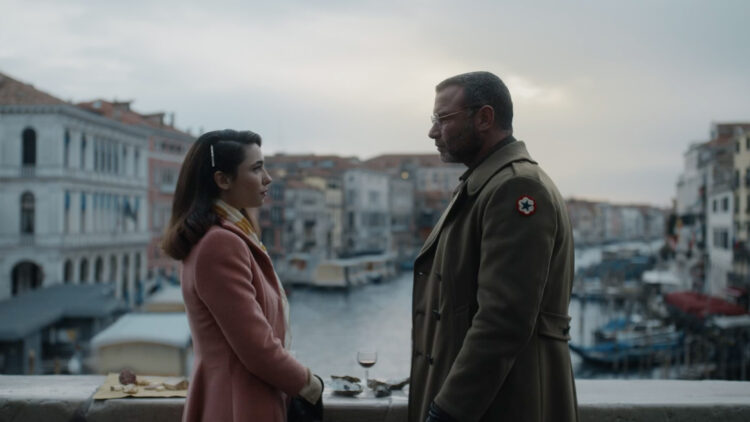

In early 1950, Ernest Hemingway’s Across the River and Into the Trees was serialized in Cosmopolitan magazine before being published as a novel in September of that same year. It was panned. Hemingway was reportedly stung by the negative reception. Only two years later, he would tread similar existential ground (albeit with a very different setting and plot) to much more critical and commercial success with The Old Man and the Sea. Hemingway was dead less than a decade later.
His work across novels and short stories has been adapted for film countless times over, and yet Across the River and Into the Trees has never properly been rendered on screen. Until now. Written by Peter Flannery and directed by Paula Ortiz, here is a handsome film that is decidedly modest in its endeavor. The best thing it has going for it is Liev Schreiber as Colonel Richard Cantwell, the lead of the picture. Schreiber is one of the actors who has somehow always been underrated, despite being capable of playing nearly any kind of part. A kind boyfriend thrust into an impossible familial situation (The Daytrippers)? Check. Tough-but-fractured fixer living on the edge (Ray Donovan)? Check. A determined, cocksure Orson Welles making Citizen Kane (RKO 281)? Check.
In every way he is the perfect performer to play a Hemingway protagonist. He’s big and tough at first blush, but vulnerable all over. His meanness is betrayed by his inherent goodness. Colonel Cantwell is a veteran of WWII, returned back to Venice, Italy saddled with a terminal illness. His doctor (Danny Huston) has instructed him to clean up his drinking and smoking so he can live a bit longer. Cantwell cannot be bothered. His determination to get to Venice to do duck hunting never is that convincing. From the moment we meet Cantwell, his exhaustion for life is clear as day. Nevertheless, the good doctor forces a military driver (Josh Hutcherson) on the good colonel, something he cannot refuse as much as he tries.
Once in The Floating City, he has a fortuitous encounter with a young countess named Renata (a delightful Matilda De Angelis) who is due to be married. Despite her lofty family name, they’re cash-poor and need the cushion of a union to a richer Italian family. In reference to the long, tired history of her family, Renata observes: “Everything in my life in 600 years old.” By and large, the overall narrative has been simplified from book to screen. It’s ultimately a smart decision that allows for Ortiz to focus on Schreiber and De Angelis’s faces as well as their effortless chemistry. The age gap is mentioned and commented on, of course, but the film is not consumed by it. Much of the edge of the romance in the book (for example, Cantwell calls Renata “daughter” as a pet name) is avoided here, and one understands why.
All of this being said, the central relationship and the on-and-off conversation between the two leads is the reason to watch this movie, much as it is the highlight of the Hemingway novel. Everything else is deeply secondary. Laura Morante puts in good work as Contessa Contarini (Renata’s mother) and cinematographer Javier Aguirresarobe does incredible work. Across the River and into the Trees played film festivals two years ago and is finally seeing a very limited release in this late summer of 2024. This is a film worth discovering, ideally after immersing yourself in the underrated novel.
Across the River and Into the Trees opens in theaters on Friday, August 30.
The post Across the River and Into the Trees Review: A Slight, Stoic, Skillful Hemingway Adaptation first appeared on The Film Stage.



